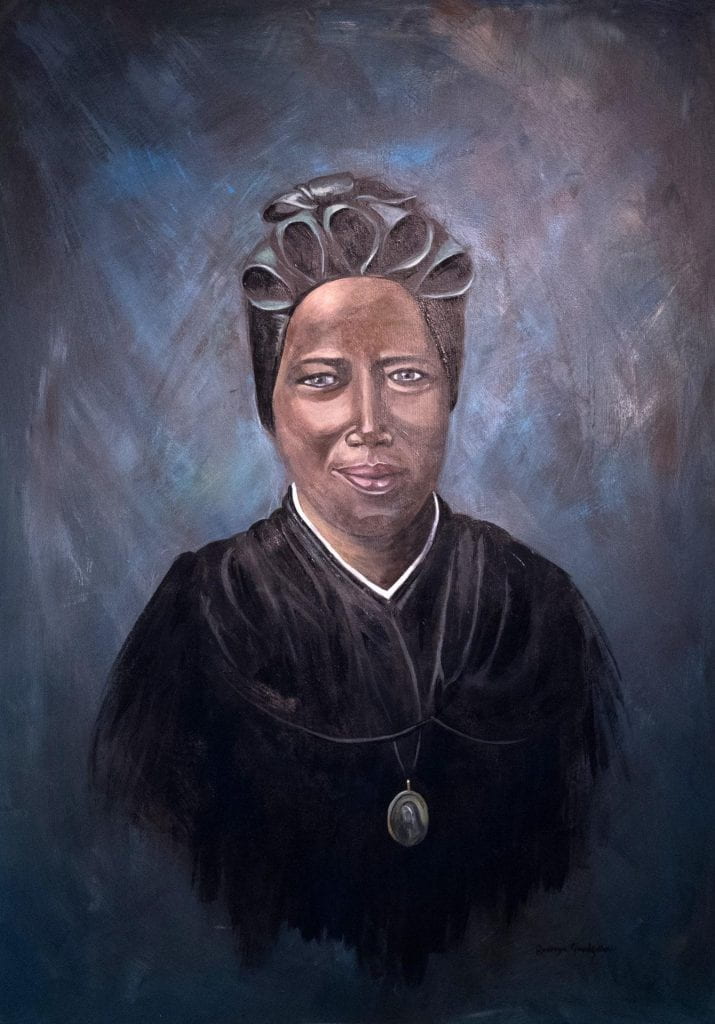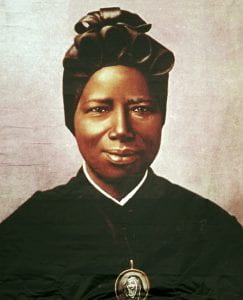 As we move from celebrating the Feast of Sr. Rosalie Rendu, D.C. (February 7th), we turn our attention to the life and example of Saint Josephine Bakhita, F.D.C.C. (February 8th), a Sudanese woman, freed slave, Canossian Daughter of Charity, patron saint of human trafficking survivors, and someone we might consider a member of our extended Vincentian Family.[1]
As we move from celebrating the Feast of Sr. Rosalie Rendu, D.C. (February 7th), we turn our attention to the life and example of Saint Josephine Bakhita, F.D.C.C. (February 8th), a Sudanese woman, freed slave, Canossian Daughter of Charity, patron saint of human trafficking survivors, and someone we might consider a member of our extended Vincentian Family.[1]
Born in 1869 to the Dagiu ́people of Darfur in western Sudan, she was raised among a family of cattle and sheep herders until she was kidnapped (several years after her older sister suffered the same fate) by trans-Saharan slave-traders who mockingly named her Bakhita (meaning “fortunate or lucky one”). Over the course of her adolescence and early adulthood, Bakhita was sold to several enslavers, who treated her with varying degrees of cruelty and kindness, until she finally found a community of support among the religious of Italy. They assisted her in securing emancipation and supported her journey of religious formation. Bakhita spent the remainder of her life living in community among the people of Schio, Italy, serving as a cook and a doorkeeper at the convent.
Few of us in the United States know firsthand the horrors and degradation of slavery; however, we know its terrible legacies of structural, systemic racism, dehumanizing poverty, and environmental degradation. Much like Bakhita, we can at times feel powerless in the face of such forces, which seem immense and beyond our individual control. Although Bakhita had limited control over the what of her life, we can look to her as an example of courage, fortitude, and hope in shaping the how of our lives; that is, the infinitely creative ways in which we can respond to the Vincentian question, “What must be done?”
As you move through today, consider how you can respond to the personal, institutional, and societal injustices that we encounter in our daily life, work, and study. How can you, like Saint Josephine Bakhita, respond to the call for social and environmental justice in your life?
We invite you to contribute your brief response by sharing a thought, a quote, an image, or a combination of these to our communal reflection at our Bakhita Mission Monday Jamboard as a sign and symbol of hope and solidarity within our community.
Reflection by: Rubén Álvarez Silva, M.Ed. (He, Him, His), Associate Director for Just DePaul, Division of Mission and Ministry
Photo credit: Marcin Mazur at https://www.flickr.com/photos/catholicism/46346193904. Creative Commons License: https://creativecommons.org/licenses/by-nc-nd/2.0/.
[1] The following sources were used in writing this post: M. Shawn Copeland, “A Woman of Courage, Fortitude and Hope” in Holiness and the Feminine Spirit: The Art of Janet McKenzie, ed. Susan Perry (Maryknoll, NY: Orbis Books, 2009) available at https://www.ncronline.org/books/2021/06/woman-courage-fortitude-and-hope; and “St. Josephine Bakhita,” Catholic Online (website), accessed February 3, 2022, https://www.catholic.org/saints/saint.php?saint_id=5601.
